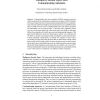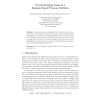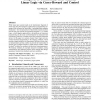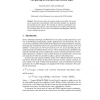157
click to vote
ESOP
2012
Springer
13 years 9 months ago
2012
Springer
Communicating finite state machines (CFSMs) represent processes which communicate by asynchronous exchanges of messages via FIFO channels. Their major impact has been in character...
115
click to vote
CPP
2011
14 years 1 months ago
2011
Abstract. Dependent session types allow us to describe not only properties of the I/O behavior of processes but also of the exchanged data. In this paper we show how to exploit dep...
132
click to vote
JFP
2010
15 years 16 days ago
2010
Session types support a type-theoretic formulation of structured patterns of communication, so that the communication behaviour of agents in a distributed system can be verified ...
130
click to vote
ACTA
2005
15 years 2 months ago
2005
Extending the pi calculus with the session types proposed by Honda et al. allows high-level specifications of structured patterns of communication, such as client-server protocols,...
109
click to vote
ENTCS
2007
15 years 2 months ago
2007
This paper proposes a calculus for describing communication-centred programs and discusses its use through a formal description of several use cases from real business protocols. ...
FUIN
2006
15 years 2 months ago
2006
This paper proposes the use of session types to extend with behavioural information the simple descriptions usually provided by software component interfaces. We show how session t...
117
click to vote
ICFP
2010
ACM
15 years 2 months ago
2010
ACM
While many type systems based on the intuitionistic fragment of linear logic have been proposed, applications in programming languages of the full power of linear logic--including...
116
click to vote
COORDINATION
2008
Springer
15 years 3 months ago
2008
Springer
Abstract. The notion of session is fundamental in service oriented applications, as it separates interactions between different instances of the same service, and it groups togethe...
127
click to vote
BIRTHDAY
2008
Springer
15 years 4 months ago
2008
Springer
Abstract. We pair session types and contracts using two encodings. The encoding of session types accommodates width and depth subtyping, two properties that partially hold in contr...
144
click to vote
BIRTHDAY
2008
Springer
15 years 4 months ago
2008
Springer
In network applications it is crucial to have a mechanism to guarantee that communications evolve correctly according to the agreed protocol. Session types offer a method for abstr...




